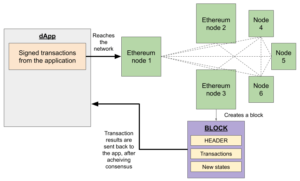
While blockchain can be considered a global infrastructure for businesses, enterprise solutions, and potentially governments, there’s in turn a whole set of components that maintain the network itself. Crypto nodes are undoubtedly the backbone of cryptocurrency network infrastructure as there’s no blockchain without them.
So let’s dive into this topic, discuss why they’re so vital, and learn two ways of using them, taking Eth nodes as an example.
Web3 Infrastructure Essentials
The term embraces all of the components necessary for supporting blockchain technology and architecting decentralized applications. These include networks of nodes, decentralized storage services, API toolkits, security solutions, and even hardware and software.
What is crypto infrastructure? Simply put, it is all the projects providing solutions for crypto-based projects.
Crypto nodes: fundamental framework for dApps
Let’s for a second go back to basics. Blockchain represents a decentralized ledger consisting of nodes that are essentially computers communicating in a peer-to-peer fashion over the internet.
Nodes are central and integral to crypto infrastructure for several reasons. Every node keeps a copy of a ledger, participates in verifying transactions, and maintains the work of decentralized applications (dApps), to name a few main functions they perform.
These devices set the rules by which dApps interact with networks. For instance, Ethereum-based applications need Eth nodes to be able to perform the following actions:
- to query data on blockchain state and get updated on changes;
- access information on address balances;
- interact with smart contracts for both obtaining network data and sending transactions to the chain.
Thanks to the network of computers forming the distributed ledger, dApps that are actually outside-of-the-blockchain interfaces have access to it and can benefit from the technology.
Ethereum nodes
Ethereum is an innovator in the use of smart contracts, which still retains the title of the most demanded protocols with the most convenient and extensive infrastructure. Unlike Bitcoin mainly suitable for processing transactions (and lately supporting NFTs), Ethereum is an underlying layer for many Web3 solutions.

Thus, having access to ETH nodes allows reading data on the Ethereum chain, processing it, and using it for supercharging all sorts of products and services.
Web3 infrastructure providers
When it comes to making the most use of nodes, there are two ways of doing so: host them in-house or work with crypto node providers that will do the hard work for you.
In the ideal world, everyone is running crypto nodes. However, in this scenario projects should be ready to keep them updated and online at all times, handle server fails, and prepare a heavy budget for doing so.
Node service providers make it easy to implement blockchain tech into any project and save costs for self-hosting nodes as well as engineering time and effort. GetBlock, one of these providers, serves many developers in connecting their applications to multiple chains at the highest speeds and availability.
How to interact with Ethereum nodes using GetBlock
Users of GetBlock get access to 50+ blockchains from the most popular to newly launched and exotic networks. The service provides RPC endpoints that can instantly be integrated into any type of crypto app and start getting data from testnet or mainnet nodes for development and testing purposes.
Depending on the use case, you can choose between two types of services provided by GetBlock:
Shared node infrastructure
If you need to launch your project in testnet, this type will be perfectly suitable for you. By choosing this option, you will share the Eth node’s bandwidth with other clients, which is a cost-efficient method for trying the product or performing beta tests. Additionally, every new user gets 40,000 daily requests to spend on interaction with shared nodes completely free of charge.
Dedicated nodes
If you’re building a highly available dApp used by a large number of people, then this service will perfectly suit your use case. Here, customers are able to adapt performance requirements, select from a set of available APIs, and tweak the geographical location of Eth nodes.
Whichever option clients choose, GetBlock guarantees to provide flawless connections at reasonable prices.
Summing up
With the help of blockchain technology, many areas of our lives can be transformed. Meanwhile, the sector of cryptocurrency network infrastructure is also rapidly growing and evolving. Nowadays, you can easily leverage the perks of blockchain technology and contribute to its thriving future by getting direct access to crypto nodes with the help of RPC endpoint providers.


































